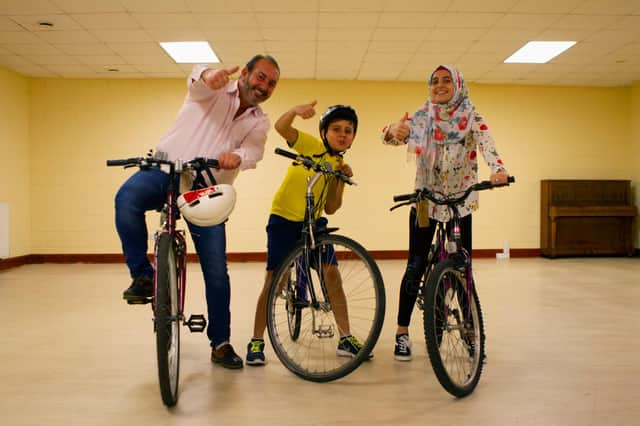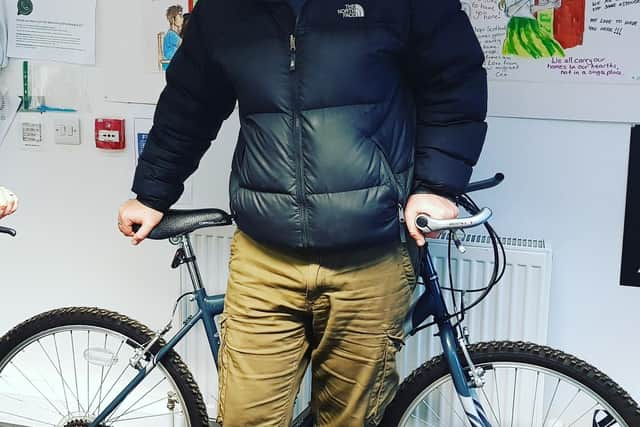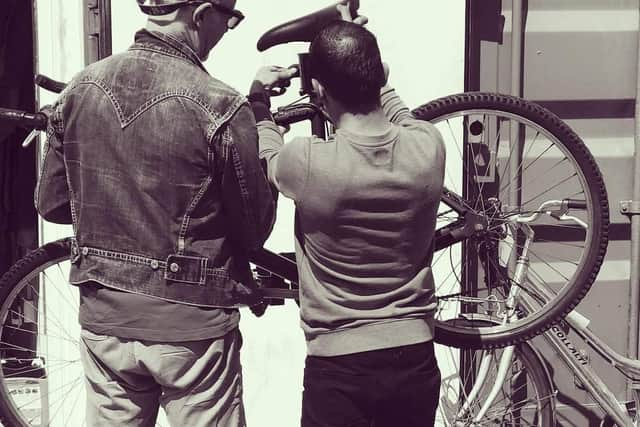More than two wheels: How Bikes for Refugees has helped settle 1,000 new Scots


Throughout March, April and May, when pandemic restrictions confined Scotland’s 5.4 million residents largely to their homes, car usage plummeted, commuters steered clear of trains and the skies cleared as planes stayed grounded.
While transport operators were panicking over empty seats, however, bike shops were having the opposite problem: they were running out of stock.
Advertisement
Hide AdAdvertisement
Hide AdDuring the peak of the virus, key workers used bikes as a pandemic-safe mode of travel, while reduced traffic allowed beginners to take advantage of quieter roads.


For others, cycling simply offered a means of staying mentally and physically well throughout the taxing months of lockdown. Bike sales soared, temporary lanes were erected and environmentalists were overjoyed as thousands cottoned on to the rewards and joys of cycling.
Steven McCluskey, however, had realised the life-changing potential of cycling long before the pandemic. In 2016, Steven befriended Yaman, a Syrian refugee who had recently arrived in Edinburgh, after helping him move furniture into his new home.
Yaman, who Steven says had “arrived with not much more than the clothes on his back”, used the little funds he had to purchase a battered second-hand bicycle. After Steven accompanied him to a bike shop, however, Yaman discovered that his purchase was ultimately useless.
“Long story short, the bike wasn’t worth repairing”, explains Steven.


“But Yaman and the guy who owned the bike shop got talking...the [bike shop owner] was kind enough to donate a [working] bike to Yaman”.
As an asylum seeker at the time, Yaman was not permitted to work and had no recourse to public funds, meaning that “the cost of something as simple as public transport was prohibitive”, says Steven.
The impact of Yaman’s new bike was instantly transformative. “He could explore his new surroundings, he could access essential services and he could connect with community activities”, Steven recalls. “It really made a huge difference to his life”.
Advertisement
Hide AdAdvertisement
Hide AdThe experience soon got Steven thinking about how many others must be in Yaman’s position, recently arrived in Scotland and struggling, as well as how many others - like the bike shop owner - would want to help them out.
Starting from just a room in his own house, Steven put out a call for second-hand bike donations which he and some volunteers would refurbish before donating to refugees and asylum seekers in need.
Within a couple of years, the project - named “Bikes for Refugees” - was a registered Scottish charity, with two bike workshop hubs in Glasgow and Edinburgh. In January 2020, they handed out their 1000th bike.
“That’s a thousand bikes that have been donated by people within local communities”, says Steven. “People like the man who gave that first bike to Yaman”.
Bicycles, first and foremost, help new Scots to explore their surroundings - but to refugees, says Steven, they represent so much more:
“When I’m asked [about Bikes for Refugees] I less and less describe the project as a bike project, and instead describe it as a project which is about supporting people’s resettlement, supporting their social inclusion and integration”.
With access to cycling, he explains, new arrivals can connect to all manner of services and activities that support their inclusion in a new society, from mental health services to English classes, social hubs, and other families - totally free of charge.
By proxy, Bikes for Refugees also ends up aiding other similar charities in Scotland. “Some refugees who volunteer will walk three or four hours a day to get there”, says Steven. “As soon as they get a bike they’re able to get there in half an hour”.
Advertisement
Hide AdAdvertisement
Hide AdThe help provided by Bikes for Refugees doesn’t end at cycling either. With two workshops in Edinburgh and Glasgow, regular (pre-pandemic) bike fixing sessions serve as social hubs for refugees in the community:
“It wasn’t unusual for sessions to run as late as eleven at night, with twenty or thirty people there...families come down, volunteers come down and everyone shares food around a table with maybe a dozen languages being spoken...it [the charity] definitely has a peer support element”.
Bikes are fixed up by volunteers who are largely asylum seekers and refugees themselves. The charity even offers a national accredited bike mechanic course to furnish new arrivals with skills while they refurbish bikes for their peers.
Training was so successful in one case, says Steven, that a refugee left the charity to open up his own community bike project on Glasgow’s Southside, fixing up bikes not just for refugees but any individuals and families who can’t afford one themselves.
One of the other joys of Bikes for Refugees, says Steven, has been introducing a number of women to bikes for the very first time.
“Many women are coming from countries where there’s just not a culture of cycling...so we’ve had women in their twenties, right up to their fifties who have never been on a bike in their lives before”.
It’s not uncommon, he says, for total beginners to quickly grow passionate about cycling, with one female refugee who had never cycled before receiving a bike from the charity and, within mere months, joining the group’s annual charity cycle from Edinburgh to Glasgow:
“As a young Syrian woman, I hadn’t had the opportunity to cycle until I came to Scotland...getting a bike from Bikes for Refugees made it possible for me to do this great outdoor activity...it’s expanded my life”.
Advertisement
Hide AdAdvertisement
Hide AdFrom annual cycle rides to bike fixing evenings, the pandemic has temporarily put a halt to the social activities embedded into Bikes for Refugees’ work - as well as creating a huge backlog - “around 300 requests” - for bikes.
Alongside setting up a scheme for key workers to borrow bikes from local community members, Steven spent lockdown handing out urgent essentials for refugees that “most of us would take for granted”:
“We got some funding to provide food packs, supermarket vouchers, phones...we’d take a phone for granted but a lot of refugees don’t have one - it’s a way of keeping in touch with family and friends, accessing information about the pandemic”.
Until volunteers can return safely to hubs, Bikes for Refugees will continue to provide as many bikes as they can to the most vulnerable - prioritising asylum seekers and unaccompanied refugees particularly. The scourge of social isolation, exacerbated by the pandemic, makes their work more vital than ever, says Steven:
“There’s been a lot of awareness in the last few years around social isolation...refugees arrive without social networks, without family, and with English as a second language....Bikes for Refugees, very simply, helps people connect with communities”.
The charity is always looking for bike donations, and hopes to grow further in the coming years under the guidance of a board of trustees, which now number among them Yaman himself - the original inspiration for the project:
“With help from Steven I was able to get a bike when I first arrived in Edinburgh, leading to the creation of Bikes for Refugees...I’m very proud to now be a trustee for BfR, representing and supporting New Scots”.